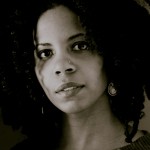Assault
By Aliyyah I. Abdur-Rahman
A new billboard went up in SoHo last week, placed at a busy intersection on Sixth Avenue a few feet behind the arrow pointing the way to the Holland Tunnel. The billboard depicts a pretty little black girl, the color of warmed honey, her coiled hair pointing skyward, tamed and decorated by a small bow. The child, reminiscent of the unborn narrator in Julie Dash’s cinematic triumph Daughters of the Dust, wears a summer dress and stands against a blue background – the blue of ocean, hinting perhaps at fecundity or birth. The child’s face seems to hold a question, and above her gorgeous, wondering eyes is a caption that reads in all capital letters: “The Most Dangerous Place for an African American is in the Womb.” Across the girl child’s belly (reflecting her babyhood and anticipating her motherhood) is the only directive viewers get for making sense of this despicable assertion, a website about Life Always (thatsabortion.com), an anti-abortion organization. Upon seeing it, I, like many others, was simply floored.
According to the founders of Life Always, the billboard is a part of a new national campaign aimed at Planned Parenthood. (The billboard in SoHo is not far from one.) Life Always claims that the campaign is designed to call attention to Planned Parenthood’s purported “targeting of minority neighborhoods.” Touting statistics about hundreds of thousands of abortions performed at Planned Parenthood facilities annually, the organization accuses Planned Parenthood of participating in a genocidal program of exterminating black children, black people, by making available in urban centers throughout the country readily accessible and low-cost abortions. According to the press release about the unveiling of the new billboard, “African Americans constitute about 13 percent of the American population, yet receive 36 percent of abortions.” Even more misleading is the outrageous and grossly distorted assertion “abortion is the number one killer since 1973 in the black community.”
Before getting into the real assault that this ad makes on black women and incumbent considerations of bodily possession, childrearing, reproductive choice, and basic autonomy and democracy, I feel the need to locate myself in the debate about abortion. I am not for it—which is not to say that I am not pro-choice. But a certain nuanced qualification is necessary here: as a Muslim, as a daughter among 13 other children, as a mother (who began the journey young, unemployed, partially educated, and in all manner of flight), I do not like the idea of abortion. I do not recommend it, and when I speak of it, I do so in solemn, devastated tones—the way I speak in general of loss, or the dead.
With that said, I recognize that women across time, cultures, generations, and geographic locales have created, evolved, and shared contraceptive and reproductive technologies. And I recognize that these are and have always been necessary knowledges because pregnancy, childbirth and childrearing are serious, life-changing matters that must be subject to the rigors of choice. Those of us who have descended from the largest forced migration in world history and racial slavery in the Western hemisphere have only recently, in last half century or so, gained legal possession of our bodies, their reproductive capacities and the progeny born(e) of us. I would not see motherhood divided from choice, intention.
On some level, though, the billboard is not really about abortion. And that is what is so dishonest and destructive about its assault. Though it claims to target Planned Parenthood, the only visible targets in this ad are black women. The same logic that has held black women responsible for what ails black America operates here (good old Moynihan!). The ad instructs us to forget legacies of slavery; structural racism; the on-going, massive, unjust incarceration of black men and women; inadequate education; racial re-segregation effected through economic disinvestment practices, housing discrimination and the erosion of affirmative action; racially discrepant nutrition and healthcare; environmental racism; and all of the other everyday assaults on black life throughout this country, especially when and where black people are poor. This provocative billboard that advances a so-called pro-life agenda through “confrontational truth” operates by advancing a well-worn, deeply painful and racist lie. The most dangerous place for African Americans is not the womb. In fact—and of course!—it is in the womb that now, as always, black life is made possible.
___________________________________
 Aliyyah I. Abdur-Rahman is Assistant Professor of English at Brandeis University. Her areas of scholarship include African American literature and culture, multi-ethnic feminisms, critical race theory, and the intersection of religion and political struggle. A two-time winner of the Darwin Turner Award for Best Essay of the Year in African American Review, she has published widely on topics ranging from the relation of sexuality and social order in slave narratives to the impacts of Civil Rights retrenchment on black familial formation and function in present day.Abdur-Rahman’s first book, The Erotics of Race: Identity, Political Longing, and Black Figuration, is forthcoming from Duke University Press. She has recently begun research on a new book project, tentatively titled, Millennial Style: The Politics of Experiment in Contemporary African American Culture.
Aliyyah I. Abdur-Rahman is Assistant Professor of English at Brandeis University. Her areas of scholarship include African American literature and culture, multi-ethnic feminisms, critical race theory, and the intersection of religion and political struggle. A two-time winner of the Darwin Turner Award for Best Essay of the Year in African American Review, she has published widely on topics ranging from the relation of sexuality and social order in slave narratives to the impacts of Civil Rights retrenchment on black familial formation and function in present day.Abdur-Rahman’s first book, The Erotics of Race: Identity, Political Longing, and Black Figuration, is forthcoming from Duke University Press. She has recently begun research on a new book project, tentatively titled, Millennial Style: The Politics of Experiment in Contemporary African American Culture.






3 Comments